By Patricia Harty Editor-In-Chief
In the fall of 1995, Pat Conroy, author of The Prince of Tides and The Great Santini, was back on the best-seller list with Beach Music. He talked to Patricia Harty about his work, his family, and his desire to find his Irish relatives.
Pat Conroy was born on October 26, 1945, in Atlanta, Georgia, to a young career military officer from Chicago and a Southern beauty from Alabama, whom Pat often credits for his love of language. He was the first of seven children.
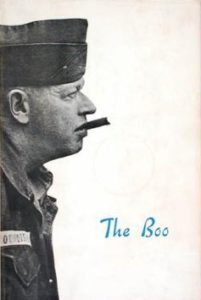
Since the family had to move many times to different military bases around the South, Pat changed schools frequently, finally attending the Citadel Military Academy in Beaufort, South Carolina, upon his father’s insistence. While still a student, he wrote and then published his first book, The Boo, a tribute to a beloved teacher.
After graduation, Conroy taught English in Beaufort, where he met and married a young woman with two children, a widow of the Vietnam War. He then accepted a job teaching underprivileged children in a one-room schoolhouse on Daufuskie Island, a remote island off the South Carolina shore. After a year, Pat was fired for his unconventional teaching practices-such as his unwillingness to allow corporal punishment of his students-and for his general lack of respect for the school’s administration. Conroy evened the score when he exposed the racism and appalling conditions his students endured with publication of The Water is Wide in 1972. The book won Conroy a humanitarian award from the National Education Association and was made into the feature film Conrack, starring Jon Voight.
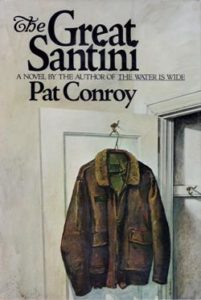
Following the birth of a daughter, the Conroys moved to Atlanta, where Pat wrote his first novel, The Great Santini, published in 1976. This autobiographical work, later made into a powerful Academy Award nominated film starring Robert Duvall, explored the conflicts of his childhood, particularly his confusion over his love and loyalty to an abusive and often dangerous father.
The publication of a book that so painfully exposed his family’s secret brought Conroy to a period of tremendous personal desolation. This crisis resulted in not only his own divorce but the divorce of his parents; his mother presented a copy of The Great Santini to the judge as “evidence” in divorce proceedings against his father.
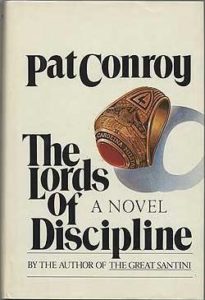
The Citadel became the subject of his next novel, The Lords of Discipline, published in 1980. The novel exposed the school’s harsh military discipline, racism, and sexism. This book, too, was made into a film.
Pat remarried and moved from Atlanta to Rome where he began The Prince of Tides, which, when published in 1986, became his most successful book. Reviewers immediately acknowledged Conroy as a master storyteller and a poetic and gifted prose stylist. This novel has become one of the most beloved novels of modern time-with over five million copies in print, it has earned Conroy an international reputation. The Prince of Tides was made into a highly successful feature film directed by Barbra Streisand, who also starred in the film opposite Nick Nolte, whose brilliant performance won him an Oscar nomination.
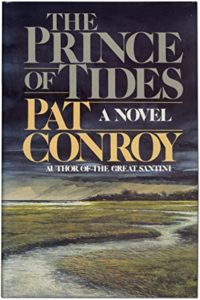
Again, the autobiographical nature of The Prince of Tides did nothing to heal the rift between father and son, and his sister Carol, who was easily recognizable as the fictional sister Savannah, stopped talking to him while he was working on the book.
Beach Music, Conroy’s sixth book and his first novel since The Prince of Tides, quickly went to the number one spot on The New York Times best-seller list — with Paramount buying the film rights for a reported $5 million before the novel hit the bookstores. Conroy, who also worked on The Prince of Tides screenplay, gets first crack at writing the script.
The book is the story of Jack McCall, an American who moves to Rome with his young daughter to escape the trauma and painful memory of his young wife’s suicidal leap off a bridge in South Carolina. For five years, McCall avoids his dysfunctional family, and the South. But after he learns his mother is dying of leukemia, he returns home to care for her, reconciles with his family and rediscovers roots that encompass the Vietnam War and the Holocaust.
As always in the work of Pat Conroy, fact and fiction are inseparable. Conroy moved to Rome in the early 1980s but returned to South Carolina to take care of his mother, who died of leukemia in 1984. He again draws on his own painful upbringing and relationship with his father as he did in The Great Santini (his father publicly denied his son’s allegations of abuse after publication of the book), for the characters of the judge and the general, both tragic and abusive fathers. And the character of John Hardin, McCall’s mentally unbalanced younger brother, is based on Conroy’s younger brother, Tom, who committed suicide in the summer of 1994. Originally, Conroy had written the suicide of John Hardin into the story, but after the death of his brother, he changed it to give the character a more hopeful future.
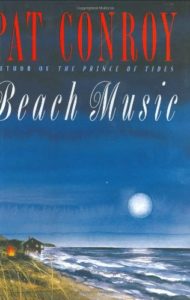
Religion is also a theme in Beach Music – Jack McCall accuses his mother of condemning him “to weirdness and freakdom and solitude” by raising him “in the only church that could mark me as a loser in paradise among my peers.” Conroy’s own Catholicism is explored in the following interview. He also talks about his desire to find his Irish relatives and to visit Ireland before embarking on his next novel.
When we met in 1995, Conroy was dividing his time between San Francisco and South Carolina. He moved to San Francisco in 1989, but returned to South Carolina to finish Beach Music. His divorce from his second wife Lenore was pending.
Patricia Harty: Can we start with your mother’s line: ‘You’re Irish and you’re Southern, so you have no excuse not to be a writer.’ Have the Southern writers been an influence on you, and how does this Irish and Southern thing come together?
Pat Conroy: In ways mysterious to me. It amazes me that I was not even aware of this Irish thing until very recently. My mother being Southern was the strongest cultural force on me. She was a fierce Southerner, who fought a geographical war with Dad, who is from Chicago.
I’m learning that Chicago-Irish is a nation unto itself. I called my brothers and my sisters from Chicago and said, ‘you would not believe how strong this Irish thing is here. And we knew not one thing about it. Dad simply did not tell us one thing about it. We knew nothing. We’re still trying to figure it out.
Many of the Irish went through such hard times over here that they did lose touch, and their ancestors are just now discovering their roots.
When I went to Ireland about ten years ago, I thought ‘let me look up some relatives over here.’ I called my Dad and he said, ‘I don’t know any.’ I said, ‘You don’t know any?’ He said, ‘I don’t know one.’ I said, ‘Dad, no Irishman in America doesn’t know one person in the old country except you.’ He said, ‘Too bad, pal I can’t help you.’
There’s a lot that the character Jack McCall says about Catholicism in Beach Music that’s not particularly favorable.
I’m not a Catholic enthusiast, at all. It seems very harsh to me, and it seemed harsh when I was growing up, and I was not prepared for the softness and ease with which the Italians wear their Catholicism. It surprised me a great deal.
When I lived in Italy, I found out that there’s a difference in Catholicism in Italy versus Ireland. I did not realize that the Catholicism I had in growing up in the south was Irish Catholicism. The nuns and priests all came from Ireland, because there was no other place that sent nuns and priests out the south. We were simply not producing our own.
As for Irish guilt. I would be glad to dump that off in your offices tomorrow if I could, only your offices ain’t big enough. I’m overwhelmed with it, I don’t know where it comes from. People tell me that it’s something, as Irish Catholics, that we all share — it’s helped ruin my life.
You write about the Holocaust in Beach Music. Perhaps the Jews are better at teaching their children their history – and we Irish haven’t been about to come to terms with the awfulness of our own Holocaust, the Famine.
And who is more articulate, who is more eloquent, than the Irish? It makes no sense. I don’t understand this at all. When I went to Chicago, I had lunch with Mayor Daly and his wife, and I had a great time, I had a ball, they were stunned to find out I had these Chicago roots. They said, ‘Why don’t you write about it?’ I said Dad only took me to Chicago twice as a child, and I simply have no memory of it. My mother also was Irish. I think the family came over early from Ireland and went to the Appalachian Hills – there were conversions and they went the Southern Baptist route. Only to make my life weirder.
You have said that you write in your mother’s voice.
Yes, my mother was a great reader. My mother was a great force behind my writing. My mother was a great storyteller who made sure that we knew the stories of the family. My mother was a great creator of legend, and a liar, and everything else you need to be a writer.
What was her background?
It was extraordinarily poor, and so was Dad’s, and I’m just finding this out about my father’s. When you’re talking about the poor and the Irish, how they suffered, I think his family got a large dose of it.
Have you become more reconciled with your father as you’ve gotten older?
There’s something that troubles me about that, and it is this. Dad knocked me around, but that is my history, I can deal with it, I have certainly tried to deal with that. I think it’s because it happened to him. I think this is the way he was raised. I don’t think he’s a contemplative man, I don’t think he thinks about this, he’s a man of action. I can deal with all that, I swear I can. What I cannot deal with is that he does not admit it. It would be fine with me, I swear, if he could say, yeah, I did it, and that’s the way it was. Sometimes Dad will just tease me, Dad is a great tease, and he’ll just say look, you’re a nice guy. I had a part to play in it.
Was it hard for you to break away from the family unit and be the writer?
I wish I had done so with more consciousness. I had never told anybody that I was knocked around by Dad, I had never spoken a word until my father beat up my mother and my brothers and sisters in my house in Beaufort, South Carolina in 1970. When I heard my mother crying downstairs I crept out of bed – my poor wife, I had not told her a word – and it was the ancient scene. It was the thing I knew. I threw Dad all over the yard that night. My mother was bleeding. My brothers and sisters were crying – I realized that I owned the house, so I told him to leave and not to come back. I come back in after putting him in his car, and am comforting my mother and brothers and sisters, and my wife is screaming down, ‘Pat, what’s going on downstairs?’ I answer, ‘Oh nothing, Barbara, nothing at all.’ And with that Irish humor, my family screamed laughing. I said, ‘Barbara, come on down, I’ve got a few things to tell you.’ That was the beginning of being able to talk about it.
That whole thing of laughing when things get too painful is very Irish.
I don’t know anything about the Irish. I know my brothers are hilarious. We’ve got it, my sisters don’t.
Your sister was upset that you drew on her experience to create the character Savannah in The Prince of Tides to the extent that she stopped talking to you. Do you two communicate now?
I’m not the first person she thinks of when she lifts up a phone. I have a feeling that’s very Irish – just not talking, because people in Chicago come up and tell me that they don’t talk to their brothers and sisters either, there are these great rifts. I said, ‘What is this nonsense?’
Well, we can make it [not talking] into an art form. Tell me about your 1986 visit to Ireland.
When I was in Ireland for the Gay Byrne show [Ireland’s #1 talk-show], it was my first contact with Irish people, and of course, naturally, they were the sweetest, nicest people I had ever met. I was overwhelmed with just how sweet they were. But after the Gay Byrne show – and it startled me – I did not realize the entire country was watching this, because afterwards I went down in the hotel the next morning and the people in the hotel started clapping. I laughed and went ‘Holy Christ, what the hell is this?’ To escape this, I race out into the street – people were honking their horns at me. I thought, ‘Does this entire nation stop for this thing?’ I was on after midnight! People were coming up to shake my hand, the pilots came out that day. But what somebody told me that absolutely startled me, was ‘Oh…you’re so lucky you live in America.’ I said ‘why?’ ‘Because if you lived in Ireland, and you had this kind of success, we would tear you apart.’ Isn’t that chilling?
Yes. How did your family respond to you being a writer?
You know what? My grandfather, till the day he died, my dad’s father, just did not accept this writing shit. Every time I saw him he said, ‘Pat, writing is not much of a future. Look – just get a job on the force. You can write when you have time off and you’ll get a pension.’ Dad thought it was an open admission that I was gay. He thought I was coming out of the closet.
I read that your own daughter is not on speaking terms with you, and of your hope that if she reads Beach Music she will understand how you feel about her. Is it easier for you to communicate your feelings by writing?
I think it is. It is certainly easier for me to talk than it is for my father. When we want to embarrass Dad, the boys, we’ll have a picture taken, and one of them will count to three and we can get Dad blushing beet red just by all of us kissing him on top of the head. The human touch – the worst of all things.
PH: In an interview with San Francisco Focus, you said that your father ruined Ireland for you.
PC: I enraged the Irish of San Francisco, I completely pissed them off. I had no idea there were a billion Irish in San Francisco – it never had occurred to me – I was trying to explain what this thing of Irish had meant to me, and I realize I’m going to have to go back to Ireland to try to discover what all this is, because I feel it inside me, all the time, and I can’t explain it.
I was raised by this dreary, somber, Irishman. Huge, mean as a snake, and I said it ruined Ireland for me. I told them that he made me hate Irish music. He would sing these dimwitted songs with the worst voice in the world, and because it was him, my oppressor, it was like England singing these songs to me. He would sing these songs, he would get drunk, and so St. Patrick’s Day he would get crystal-knocked – the one thing I know is that he will be drunk that day. It was one of these things where all the things Irish that could be beautiful, came to me twisted.
That’s an awful shame, because we really do have a very rich culture.
You produce these writers that write like dreamboats.
You write about protesting the Vietnam War in Beach Music. Is that from your own experience?
PC: It happened to friends of mine. The head cheerleader at Beaufort High School was arrested for destroying draft files, and she came from one of the oldest families in South Carolina. My remembrance of this time is that several of the kids I went to high school with were in the anti-war movement at the University of South Carolina and were arrested and thrown in jail. There was an Asian provocateur who was her best friend and I had always remembered that story as being the greatest betrayal I had ever heard of. I’ve been saving that story for years to write about it and I went back to interview all those kids.
You have written many memorable lines in Beach Music, but the one I remember about Vietnam is when the character Jack McCall says, “as a country, Vietnam was not important; but as a wound, it was unbearable.”
I can’t remember things I write after I write them. Actually that sounds nice, I hope I wrote it.
What are you working on next?
PC: I think there’s going to be an Atlanta novel, but I want to go to Ireland before I start writing, too.
I think it’s important to know your heritage.
The thing is I know I have relatives, but I don’t know how to find them. I just don’t know how.
I think they might find you after this interview.
After that Gay Byrne show, it was just overwhelming. One guy came up and said, ‘My wife and I have a pig farm in Northern Ireland, could you please come and stay a few days, you’d like it.’ There was such great hospitality, such warmth. I said, ‘Dad, how do you come from this amazing people and be as mean as you are?’ and he says, ‘Just luck son, just luck.’
Would you trade in all the success for a more normal childhood?
I certainly would. You know, my dad got his feelings hurt with The Great Santini. I said, ‘Dad, you don’t understand, America’s going to love you. America loves guys like you.’ When Robert Duvall and Michael Keefe were nominated Oscars, he came running into the room and said, ‘Son, you and I were nominated for an Academy Award, your mother didn’t get nothing.’
Before he realized that, though, it was hell. My grandmother said she’d never speak to me again or meet my children, and she died without meeting my children. My grandpa never met my children. I paid a price for that, but when Dad came back and we faced each other after that, he said, ‘I didn’t do that’ and I said, ‘Yes you did,’ and he said, ‘I don’t remember’ and I said, ‘Then say you don’t remember, that’s different.’ I said, ‘Dad, I’m sorry your feelings are hurt, but I want to tell you something, pal, you’re a tough guy, you’re an Irish guy, you’re a Marine, and I want you to take this tough guy. Nothing I said in this book makes up for my ruined childhood, I want you to know that. And here dad, is something else I want you to know – you raised a guy as tough as you are.’
To get back to the Southern writers and what has been described as ‘Irish lyricism’ in your work ….
The thing is that amazes me now, is that I don’t know about this stuff.
Well, you know Flannery O’Connor’s great-grandfather was a Patrcik Harty from Tipperary.
Are you kidding? Have you ever been down to her house in Savannah?
No, I haven’t.
You’ve got to do that. Flannery always tickled me, I wish I could have met her. It amazes me, Flannery, the most fiercest Catholic in the world, does not feel like a Catholic to me when I read her. Everybody’s Protestant in her books.
Margaret Mitchell’s [Gone With the Wind] great-grandfather was also from Tipperary. He and Patrick Harty emigrated to the same place in Georgia – Locust Grove, in Taliafero County, which was the largest Catholic settlement at the time. So there’s much about the South, even the music – that comes from the Irish.
I didn’t realize that my love of Southern music put me in the tradition.
Flannery O’Connor once said that the trouble with most writers was that they weren’t from anywhere.
That is no problem for me, but I have a feeling, too, that is related to an Irish need for place.
The sense of dislocation that stems from emigrating. . .
I just found this out. I’m sitting in Birmingham, Alabama, my father’s come down, I’m receiving some kind of award – which he told me not to brag about – he had a great time, he signed a lot of books. I’m sitting there, and we’re waiting for this ceremony to go on and the phone rings – it’s a Conroy from Birmingham. This very nice woman says, ‘I think we might be related, I hear we are.’ ‘Well you certainly called at the right time, my father’s here.’ She said, ‘My grandfather was one of five brothers born in Bloomington, Illinois.’ I said ‘Bloomington, Illinois? I’m sorry, there’s nobody in our family with a Bloomington connection.’ My father said, ‘Wrong.’ I said, ‘Dad, who was born in Bloomington?’ He said, ‘Your grandfather was born in Bloomington.’ ‘You told me Chicago.’ ‘Wrong.’ ‘Grandpa didn’t have any brothers, did he, Dad?’ ‘He had four.’ I said, ‘Excuse me, ma’am, I just learned of the existence of great-uncles for the first time in my life.’ He talked to her for a long time, and afterwards I said, ‘Dad, what is this? Nobody would have loved knowing Grandpa had brothers more than me. I could have visited them. Why didn’t you tell me?’ ‘You never asked, son.’
These guys all went to different places and they lost touch with each other.
In Beach Music you named the town Waterford….
I named it that because I loved the name of that Irish town.
And not because the Conroys were from there?
I said, ‘Dad, where are we from?’ ‘I don’t know.’ I said, ‘Every Irishman knows where he’s from. I wanted to get one of those Irish passports – then I found out it was my great-grandparents that came over and I said son-of-a-bitch. Once again, f-ed by the Irish. I’m dying to get a passport, and they come over a generation too early.
Your father could get one.
And he won’t.
You went to the Citadel – what do you think of Shannon Faulkner’s fight to join?
You know, I’m for her. I wanted to stay out of this fight, but they bullied the kid. They sent me sweatshirts saying ‘”Save the Male /Shave the Whale.” They sent me a sweatshirt with her face on a bulldog with all these bulldogs behind her crying that said, ‘You’d cry too if the only girl on campus looked like this.’ I called the Citadel and said, ‘Boys, I am coming in. Stand by.’ So I jumped in and I told them. I read the fourteenth amendment again and it’s the same amendment that got black kids into that school. It’s state-supported, women pay taxes to the state – don’t make them pay taxes if you don’t want them to go to your schools. Then I said, if she has trouble getting a date to the Ring Hop, I will be glad to take her. And I call her periodically, and I tell her that if one kid lays a hand on her, I’m going to make him world-famous the next day.
The descriptions of food in your book are mouthwatering. Do you cook?
I love food. I am a good cook. I found some good recipes in Dublin, but someone told me something that moved me a great deal. They said when you’re oppressed and starving for 800 years, cuisine is one of the last things you think about.
You’ll have to go to the west coast of Ireland if you like seafood, where they have the best mussels and oysters.
Maybe when I go to Ireland, I’ll write an article for you all. I’ll tell you what I’ve discovered.
That would be great.
Because I’m very, very curious, and I’d love to find these people I’m related to. One of the things that stunned me when I was over there – people looked funny to me walking down the street. They looked very funny – they all looked like me.
That’s funny – I get the same feeling when I go to Boston. Where are you going to live next?
I don’t know. I’ve thought about New York.♦
This interview originally appeared in the September/October 1995 issue of Irish America.
Pat Conroy died on March 4, 2016. It is to my regret that I never followed up on his offer to write about his trip to Ireland. In 2015, I visited Savannah, met with the Harty family who are related to Flannery O’Connor, and visited the graveyard where they are buried. The family names, William and Patrick are names carried down in my own family, and it would appear from family records that indeed, and much to my delight, I am a distant relative of Flannery O’Connor.

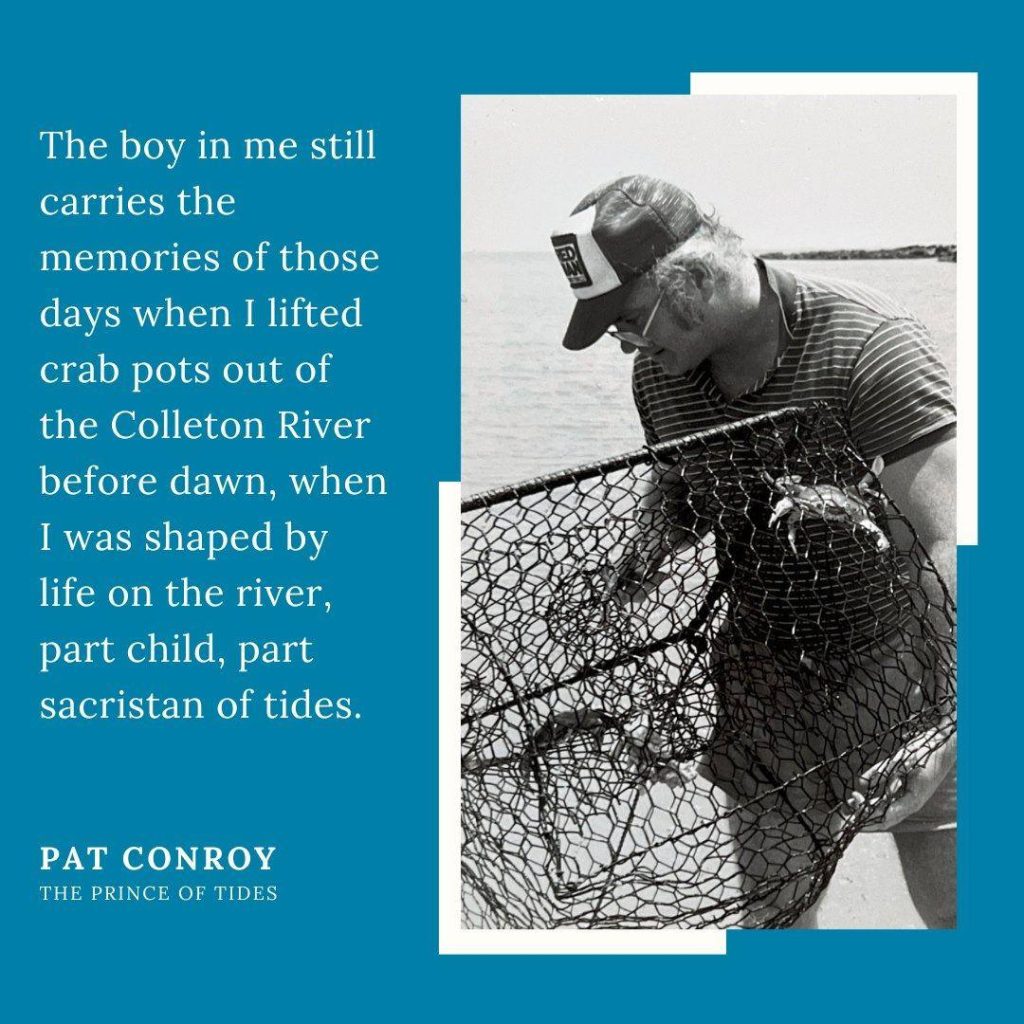
Leave a Reply